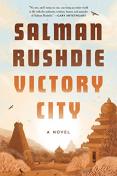
by Salman Rushdie
Hardcover- $24.99
The epic tale of a woman who breathes a fantastical empire into existence, only to be consumed by it over the centuries—from the ...
Overall rating:
How would you rate this book?
Member ratings
Victory City, Salman Rushdie, author, Sid Sagar, narrator
Centuries ago, when Pampa Kampana was 9 years old, in India, she watched, horrified, as her mother entered the funeral pyre, following other women who had gone before her. It was the common practice of the day for widows, but Pampa was unprepared for what she witnessed. As her mother self-immolated, in what was the common practice of suicide for widows in those days, the spirit of a goddess entered Pampa. This Goddess called Parvati, speaking directly through her, told her of her future. She would live for an additional 200 years after she created a magnificent city and future empire. After her death, her story would remain hidden for 450 years. She would not have the power to prevent any of this from happening. It was her fate. After this possession of her spirit by Parvati Pampa did not speak for the following 9 years.
Suddenly, Pampa discovered she was literate. She was given a bag of seeds by the Goddess which she passed on to two brothers. They become the architects of her city, simply by planting them. As they watched the magical rising of a city from seeds, like plants, the magic astounded them. Suddenly they were filled with thoughts of grandeur and decided that they would become the heirs to the throne in this city, and so they became the future rulers, beginning the march toward Pampa’s end. Although the city would rise and become spectacular, with hopes for a world of beauty and love, the human frailties of greed and the desire for power would bring about its demise.
The tale, often requiring the suspension of disbelief, as it uses magical realism, anthropomorphism and transmogrification to illustrate and mock the shallowness and pettiness of the values we live by and cherish, often foolishly, our similarities and differences appear in stark contrast. The novel will demonstrate how our stubbornness to adhere to destructive desires will bring about the eventual end of what was meant to be a utopian world, that instead, descended into a world filled with injustice, and man’s inhumanity to man.
Because the prose is so beautiful, and the narrator reads the words with such feeling, it is difficult to stop listening, even when the tale gets so entangled in ideas, unknown places and characters that it grows confusing. As the author presents a fantasy that mocks our world, a world often rife with petty grievances, it is often humorous and often sarcastic. The readers cannot help thinking about the situation in our current culture that causes unrest and wars as they watch Pampa Kampana’s life reveal itself.
Pampa does not age and is forced to watch as her lovers, husbands and children age before her, eventually dying and leaving her behind. Using real cities and people from history, Rushdie blends facts and fiction to create this allegory. His message about the moral decadence of our world is obvious although it is hidden in this very creative, if not always easy to read, fantasy. Rushdie mocks our religious beliefs, and our social and cultural mores as he exposes, among other things, the racism, xenophobia, conflicting religious practices, sexual deviance, homophobia, greed, jealousy, and hunger for fame, fortune and power that humans are heir to. He deftly reveals the cracks in our own society that he seems to feel will eventually destroy us, as well, because of our human frailties. Sometimes crude, sometimes outlandish, it is always on point exposing society’s ills. It is very provocative as it questions every value we cling to, values that are often self-destructive and condescending. Sexual behavior is often exaggerated or stressed as Pampa suffers the consequences of the exigencies of her life. Occasionally, the language seems unnecessarily crude, but I expect that the author is also mocking our use of language to hurt others. Words can cause destruction. The allusion to pink monkeys warring with monkeys of other colors, is obviously an illusion to racism and the use of elephants reminded me that there are many elephants in the room that we ignore.
Book Club HQ to over 90,000+ book clubs and ready to welcome yours.
Get free weekly updates on top club picks, book giveaways, author events and more








